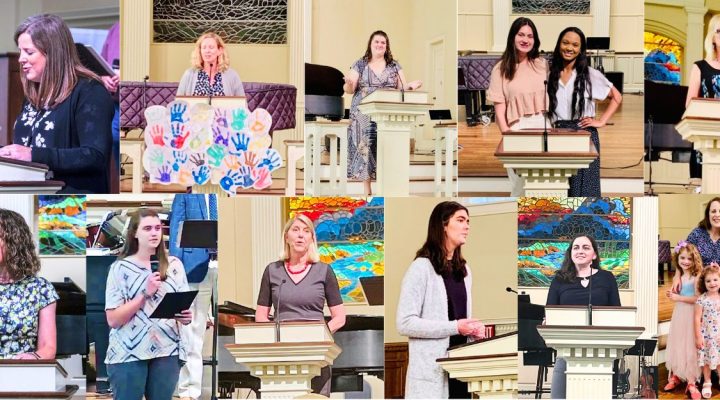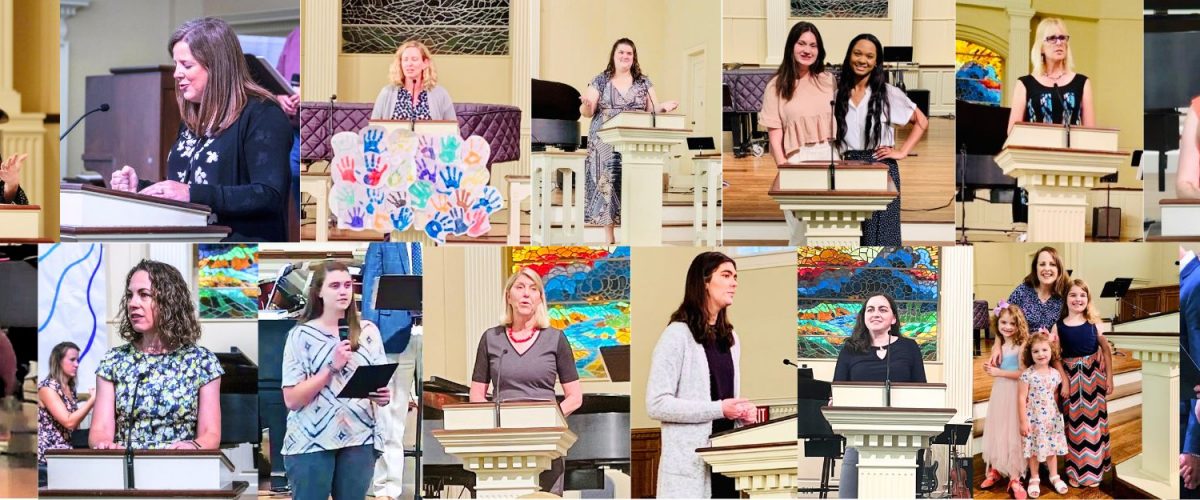As an associate pastor, I made weekly hospital visits. The church’s size meant it was not unusual for me to meet church members for the first time in the hospital, which was what happened one Thursday morning when I knocked on a hospital door and heard, “Come in!”
I walked into the room, we exchanged “Good mornings,” and I introduced myself. The man in the bed responded, “So you’re a pastor at the church, eh? I’ve never been much for women pastors.”

Hannah Coe
To this day, his response easily ranks in the top five of my Awkward Conversation Starters and Unfortunate Remarks list. The list also includes: “Why do you keep talking about the woman thing?” and “I don’t have a problem with women leading in the church as long as they’re not feminists.” and “You do know that women only take leadership in the church when real men aren’t there to fulfill their duties, right?”
Women’s leadership in the church has dominated recent Baptist news. Lists compiled to make a case for the “growing and urgent problem” of women’s leadership in Baptist churches. Convention votes dismissing the leadership of half the population and disfellowshipping churches where women lead. A few weeks ago, a Baptist denominational leader in Texas referred to women’s leadership in the church as a secondary issue in one publication, after he referred to it in an earlier publication as a tertiary issue.
If we’ve seen nothing else in recent Baptist news, we’ve seen that women’s leadership in congregations is anything but a secondary or tertiary issue. If it were, lists would not be made and congregations would not be disfellowshipped. The power and influence of women’s leadership in shaping God’s future would not be seen as a problem (read: a threat).
“If we’ve seen nothing else in recent Baptist news, we’ve seen that women’s leadership in congregations is anything but a secondary or tertiary issue.”
Women’s leadership in congregations is a primary issue, for one because women’s thriving — our abundant life — means the thriving of our congregations and communities. The data bear out again and again that women’s thriving means the thriving of communities the world over.
What’s happened this month in Baptist life reminds us that we must keep talking about the “woman thing.” Because, just as women’s thriving leads to communal thriving, diminishing women diminishes us all.
I’ve been reflecting recently on how primary, secondary and tertiary doctrinal issues are used to structure life — and authority — in congregations. Primary doctrinal issues are considered matters of salvation. I’ve long struggled with this tiered way of understanding God and shaping congregational life.
Although Jesus is traditionally considered a primary doctrinal issue, which I agree is central to being a Christ-follower, the Jesus I read in the Gospels doesn’t refer to himself or doctrine as the primary issue. Jesus’ teachings, life and death convey that loving God and loving neighbor are the primary issue around which all other issues are to be arranged.
The longer I live, the more I am convicted women’s leadership in congregations is better understood and embraced as a primary issue, a matter of salvation, central within the heart and life of God. Women’s leadership is a gospel issue.
“Women’s leadership is a gospel issue.”
Contemplation and conversation about salvation are part of everyday life for me as a pastor. We often think of salvation in one tense — future. We associate salvation with death and what comes after, a worthy consideration.
While a less common association in our religious psyche, in the biblical tradition, salvation is not only a matter of what happens after we die but what happens while we live. The Bible speaks of salvation in three tenses: past, present and future. God’s saving acts are not limited to heaven or one-time transactions; they put on flesh and come among us.
A compelling argument could be made that God’s saving action is in fact imagined, narrated and conveyed primarily as a before-death matter in the biblical texts. God delivered the Israelites not into heaven, but into fulness of life in the land as whole human persons, no longer enslaved to Pharaoh’s Egypt.
In John chapter 9, Jesus saves a blind beggar from a life of hunger, isolation and darkness. Ironically, the man’s religious community rejected him after Jesus healed him. But God’s saving acts in the blind beggar’s life move him from marginal, non-person status into Jesus’ fold where he can be a full human person within the care of God’s provision through loving community.
Jesus did not tell the blind beggar to go to heaven to experience salvation; Jesus brought salvation into his present life.
The Gospel of John envisions God’s coming glory as a garden in which the thriving life God desires in creation is fully realized. One of the most frequently quoted Bible verses, John 3:16, says everyone who believes in Jesus will have eternal life, except the Greek is mostly aptly translated “eternity life.”
Eternity life is a common theme in John’s Gospel. It is a quality of life, the thriving life God intends, to be experienced now and in eternity. The incarnation of eternity life in Jesus is a saving act of God. Wherever Jesus is, eternity life, and salvation, are present and communal life is reordered around the centrality of God’s love-initiative in creation.
“Limiting the ways God can work in women’s lives … damages our witness and harms the relational fabric through which God’s salvation comes to us.”
Any form of misogyny, the hatred of women resulting in their oppression, is inconsistent with eternity life, rejects the saving acts of God and is a clue that communal life is ordered around something other than God’s love-initiative. Limiting the ways God can work in women’s lives not only diminishes the statistical likelihood of communal thriving, it also damages our witness and harms the relational fabric through which God’s salvation comes to us.
When I met that man in the hospital, he was dying. Over the months, I learned our inability to connect reflected the absence of human connection in his life. I hoped for the grace of a good death for him, including companionship, but I still have a nagging feeling no one held his hand or spoke assurances of Christ’s open arms waiting for him.
I wonder how his inability to connect with “women pastors” diminished his experience of God in his dying? I wonder how the ideas and experiences that shaped his first words to me diminished not only his dying but also his living. The seeds of disgust and dismissal were sewn and sprouted long before I met him. I wonder what connections were missed in his living, how much love was not exchanged, what beautiful reflections of God’s image he did not see, and in what ways his living and giving were less whole and expansive than they could have been.
I made another hospital friend in those associate pastor years. Each of our visits began with a loud, “Well hello Pastor Hannah Coe! You know I’m better’n I deserve today. How are you?”
We got to know each other over the years in the hospital as he was never well enough to attend church. In every conversation, he told me he knew the window of his life was closing, but not once were his door or his heart closed to me. He let me be a pastor to him as he prepared to die, one of the greatest honors of my life.
His daughter and I became friends, too. She was her parents’ only daughter and her mother had died years before. Her dad was her only family; they were thick as thieves and each other’s treasure. When her dad died, her entire world shifted. But the connections shared among the three of us lived on; her dad’s open spirit, his willingness to love and be loved, enriched our lives on this side of heaven.
When his daughter and I exchanged hugs at the front door of the church on Sunday mornings, especially on holidays and birthdays when our eyes glistened, the knowing glance we shared witnessed to the grace of not only a good death, but a good life. Eternity life, full of kindness and connection. Salvation in three tenses.
I long for congregations and communities to see what they are missing. I long for the world to realize what is lost by diminishing women and their role in the gospel of salvation. The sins of misogyny and patriarchy are embedded in all our lives and churches. But so are women. Women whose ways of being and leading in this world bring thriving, growth, life, energy, hope and opportunity to share in the saving acts of God.
We still sow seeds of disgust for and dismissal of women’s leadership in the church. Yet, God desires, through us, to sprout new life in places of death.
A garden in which all women thrive exists in God’s imagination and calls for cultivation here and now. The harvest is plentiful and no one who puts a hand to the plow and looks back is fit for the kingdom of God.
In the meantime, women will continue knocking on the doors of our lives, ready to offer God’s care, compassion, courage and salvation, even to those who’ve never been much for women pastors.
Hannah Coe serves as senior pastor of Calvary Baptist Church in Waco, Texas.


